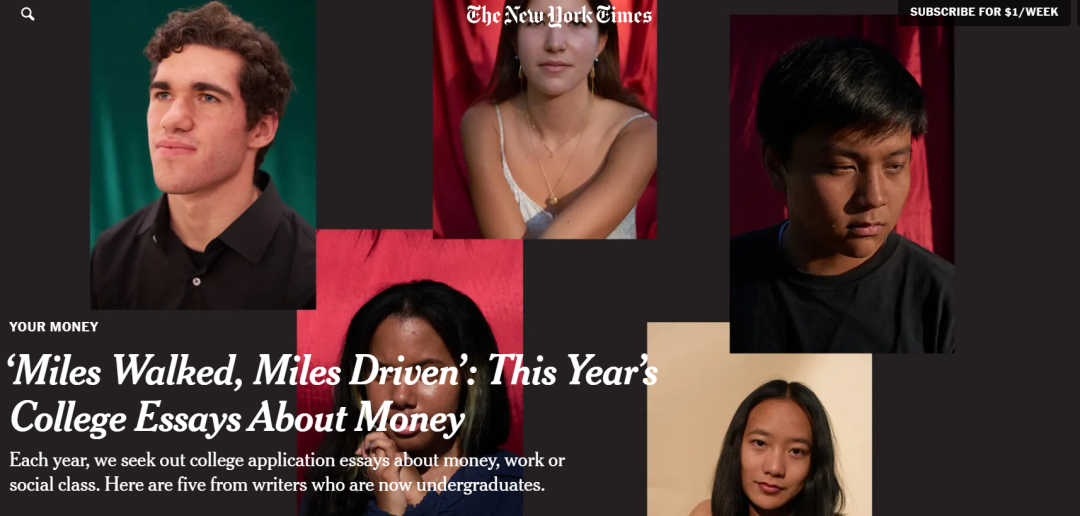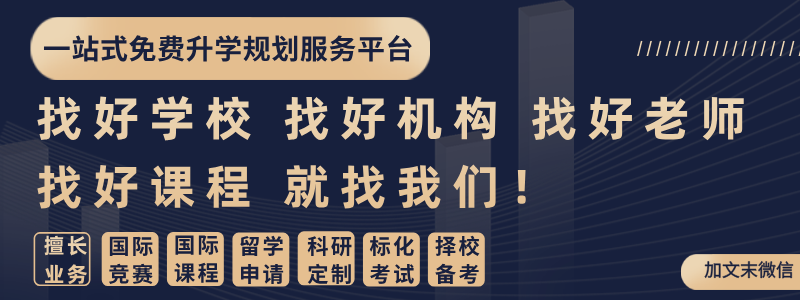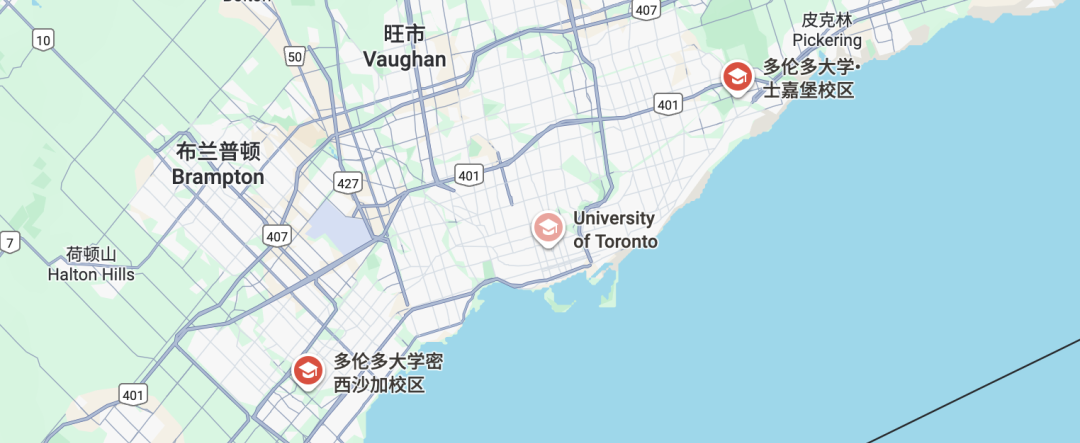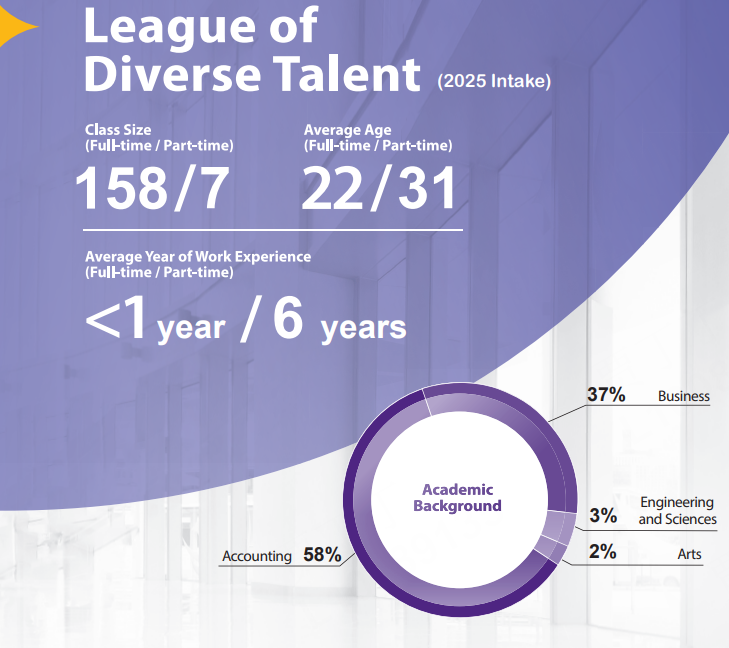距离11月30日UC九校申请截止仅剩1周时间,距离大部分美国大学RD申请截止不足40天。
这个时间节点,还有不少准留学生没能从折磨人的文书写作中解脱!
越是这种关键时刻,越要稳住!老师强烈建议中国准留学生们参考新鲜出炉的——
2022《纽约时报》最佳录取文书

作为一个世界闻名的权威媒体,《纽约时报》从2013年开始,每年都会征集优秀的大学录取文书,供同学们学习。
这些备受瞩目的文书,对于国内学生而言非常具有参考价值,主要因为以下5大特点:
1. 筛选团队大多是在教育、升学领域的资深专家,选出的文书具有一定权威度和普适性;
2. 每年“最佳文书”仅有4-5篇,它们能从数百篇征集文书中脱颖而出,可见内容足够深刻和动人、表达足够流程;
3. 每年的最佳文书主题都是关于金钱、工作或社会阶层,在帮助同学们开阔思路的同时,启发同学们写出能激发招生官同理心的文书。
4. 最佳文书的作者背景各样,适合不同阶段、不同层次的学生进行参考;
5. 美国学生在文书中常常会有比较多细节描写,善于表达个性化,敢于突出“我”的想法和声音,而这些都是中国学生的文书非常欠缺的。
为帮助大家更好地理解如何从0到1写出一篇“好文书”,老师特别邀请到我们中美导师团队中5名美本申请资历深厚、指导学生文书写作经验丰富的导师,针对《纽约时报》最佳文书进行独家解读!话不多说,一起了解今日的重磅内容!
5篇《纽约时报》最佳文书及独家解读
01
Mom always told me that if my hands were smooth and unblemished nobody would be able to tell my age.
She wore rings and gloves to cover up the premature wrinkles from her time as a waitress in high school and the scars on her fingers from her first four years in America as a seamstress.
Try as she might, no amount of jewelry or hand cream could erase those markings. But I envied her imperfections: Mom’s weathered hands spoke volumes about her strength, selflessness and love.
Whenever my family gathered at the dinner table, I would steal glances at their hands. Each wrinkle and scar read like a chapter of a life well lived: a life full of purpose. When I looked at my smooth knuckles and babylike palms, I wondered when I would receive markings that told my story.
When Dad squeezed my hand as we crossed the street, I tried to place the sharp ridges and rock-hard calluses that dug into my soft skin. Did they come from summers in Montenegro, gripping the worn handle of the scythe to cut hay? Were they caused by heavy tiles nicking his palms during the kitchen renovations that paid for my babysitters?
During summers in Pljevlja in Montenegro, I would watch Grandma’s trembling hands as she kneaded each piece of burek. What initially seemed like splotches of flour were actually burn scars from 70 years of cooking. Perhaps they came from adding one too many coals to the furnace or accidentally lifting pots out of the oven with her bare hands.
Their hands symbolized their love and sacrifice for family. But my unblemished hands signified nothing in return, only evidence of wasting away their hard work. So I tried to gain markings the only way I knew how: mimicking my family’s defining actions.
I attempted Grandma’s burek, but my imitation’s flaky shell hardened each time I took it out of the oven. And my burns never felt purposeful, only documentation of my mediocrity.I tried picking up a needle and thread like Mom. But even as my hands took the shape of hers, the needle pricks left me unsatisfied — it never came naturally like for Mom.
My hands began to read like a list of failed ventures — until I found volleyball. Volleyball seemed like a forbidden interest, so independent from family. But each purposeful movement left me satiated with fulfillment. I picked up the game quickly, and my parents were thrilled: Recruitment was my ticket into a top university. I even fractured my thumb while diving for the ball, the bone awkwardly jutting out as my own personal talisman of greater purpose.
But during high school, I was exposed to a plethora of other opportunities. I began spending Monday nights practicing cases for Mock Trial and dedicated weekends to taking photographs for my school’s Dynamo literary magazine. And though my hands remained unchanged, these passions, along with others, showed me sides of my identity that I didn’t know existed.But with little time left for volleyball, I came to the decision to leave my club team. My crooked thumb became an ominous reminder of another failed pursuit.
My parents were furious. They perceived my new activities as unfocused distractions, leading me away from my ticket to college.
I soon understood that my parents’ anger did not stem from disappointment, but from unfamiliarity. Their only path forward was committing to their available roles, never pondering the existential questions I did: self-discovery in a sea of options.
Becoming “lost” for pursuing seemingly unconnected interests was not what they envisioned for me, but I realized that the best way to fully take advantage of my privileges was to explore all my curiosities. I stopped emulating the identities of my family and realized that my hands would eventually bear the weight of my pursuits.
More importantly, those markings and hands will be my own, not my mother’s or father’s.
作者:Katya Spajic
高中学校:Bronx High School of Science
导师独家点评
这篇文书的切入点非常有趣——手。
每一双手承载着不同的生活故事,作者巧妙地通过每双“手”的伤痕透露出了自己的家庭背景,比如做裁缝养家的妈妈,来自黑山且需要干重活补贴家用的爸爸,为家庭做了一辈子饭的奶奶。简单的几句描写,就透露了她并不富裕的家庭背景。
每双手上的印记,其实都是生活阅历和对家庭付出的体现。而作者光滑的双手,恰恰说明她没有能像家人一样,有丰富的经历和自己独特的故事。
为了增加人生阅历,作者尝试模仿奶奶做饭、模仿妈妈做针线活、以及做更多的事情。而她的一次次的失败告诉我们,这些并不是属于她的人生道路。
当她找到自己对排球的热爱后,一切似乎出现了转机。她终于因为排球的伤痕拥有了自己的手部印记,她的家人认为她找到了方向,期待着她能够因为体育特长而被大学录取。
其实写到这里,已经是一个相对完整的故事了,但是作者在最后部分的升华成为这篇文书出彩的关键。
她并没有坐在排球的“功劳簿”上,而是遵从自己的内心继续进行不同领域的探索。这也是她和家人不同的地方,不是单独的一个角色,而是多面的自己。她终于能够找到自己独特的定位,去追求自己的人生。
这篇文章也为同学们的文书写作提供了很好的思路:不需要宏大的主题,或者多么与众不同的故事,从生活中最平实的细节入手,讲述“自己”的故事和心路历程,这就是最独特的,也是招生官最想看到的文书!
02
The room was stuffy, cramped and packed with teenagers. I was about to embark on a new adventure — my first job. I made sure I brought everything listed on the required materials list: Social Security card, passport, student ID, work permit.
As I waited for the human resources personnel to call my name, I gingerly opened my passport. A glance at the photo taken when I was 12 brought a big smile to my face: Chubby cheeks. Bowl cut hair. Forced smile. My jolly mood quickly faded when I read the expiration date: 03 Jan 2022. As I flipped through, each page was blank. My heart felt empty.
I tried to shake off the sadness dominating my thoughts. I should not have been bothered by my empty passport or its pending expiration date. But I was. It was a painful reminder that I had never left the country, not once in my entire life.
I remained quiet even as my mom repeatedly asked how my job orientation went. My replies were a mere yes or no. But when we got home, I held up my passport and finally dared to ask her. She looked at me and responded: “I’m sorry, but we can’t afford it. Airfares alone for a family of five would cost an arm and a leg.” Her quavering voice said it all. I walked away, empty. My passport was for “just in case,” not “when.”
When I spend time with Grandma, I am greeted by her cabinet full of cherished souvenirs. Some mark her 90 years on earth, others Grandpa’s travels as a merchant marine. Admiring the elephant tusk from India, brass plates from Morocco and hand-carved Last Supper wall hanging from Italy, I often wondered what it was like to travel the world just like Grandpa did.
Today, I catch myself looking back at those visits at Grandma’s and realizing I don’t need to leave my beloved city — Los Angeles — to experience the world. I satisfy my wanderlust by feasting on hearty, delicious global cuisines here in my neighborhood. Couscous from Morocco. Vindaloo from India. Gelato from Italy. Each is a small marker of my city’s diverse population and the perspectives and experiences surrounding me.
The first and last thing I see from my bed is my vast world map from Ikea, occupying almost an entire wall. This map has been my constant travel companion since I was little. Beginning with Dad’s stories about his business travels early in his career, this map has taken me to the countries he toured and locals he befriended from Belgium to South Korea to Indonesia.
Through Google Earth’s lens, I’m able to transport myself to any far-flung places without leaving the comfort of my bedroom. I have explored the Philippines, where my mother was born and raised. Her accounts of her upbringing fascinated me growing up, the tropical climate a drastic change from L.A.’s dry, sunny summers. When I showed her the schools she attended, the church where she and her family worshiped every Sunday, and the empty land where her house once stood, she was delighted. I was, too.
I don’t need to set foot in an airport to know every country, city and capital in the world. The knowledge I amassed, from the map in my bedroom to virtual tours, has taught me that not traveling outside my birth country will not define who I am. I pull what I can from my surroundings, whether wandering my neighborhood or following the virtual tour of the Louvre’s Petite Galerie exhibition of founding myths. And there are dozens of UNESCO sites still to see.
I am a globe-trotter. Travel costs may prove too great a financial strain for my parents, but my world map and ingenuity are free. So while my passport pages are empty, my limitless adventures are being vividly stamped in my mind forever.
作者:Griffin Ayson
高中学校:Van Nuys High School
导师独家点评
在很多中国学生的眼里,这篇文书或许完全称不上“了不起”:一名普通学生,渴望了解世界,但是因为经济原因被困在原地;没什么了不起的成就;文书用词比较质朴。但我们仔细思考就不难发现:平淡才真实,而真实才是真正能打动人的地方!
首先,文书所凸显的作者的形象是,一名求而不得、躁动、不甘又无奈的少年。“求而不得”其实是很多青少年都有过的经历,这个形象既生动又立得住。
其次,作者善用“平凡”的词汇将情感高效率地传达给读者,并让人印象深刻。例如:
“看到自己即将过期的护照依旧空空如也,心中也难免‘empty’;有护照只是因为‘jast in case’而不是‘when’;看到祖父祖母留下来的东西,心里油然而生的‘admire’。”
这些细节的表述词汇无非是日常对话水平,但细想之,冲突感真的需要“华丽辞藻”凸显么?
借此,同学们写文书时要反思一下:我们写文书是为什么?为了炫耀?还是为了让读者记住你?毋庸置疑,只有真真切切地把自己的情绪展示给读者,引发读者共鸣才能被深刻记住!
再者,作者突破困境的方式很有特点,不是背包穷游,也不是打工攒钱, 而是看起来非常朴实的做法——在洛杉矶品各地美食,在Google earth上看世界。
一个没办法离开家门的少年,却想尽办法观察自己身边的一切,发现原来世界就在自己身边,少年的热血感体现的淋漓尽致。读完整篇文书,我们不难感受到探索世界的梦一直在作者心里,他为了实现梦想上下求索,有着一个了不起的灵魂。
老实说,中国学生写文书有一个通病——觉得自己的生活平淡如水,没有值得写的素材。但这篇文书恰恰告诉大家,不是所有人都能做出个反应堆,或者十几岁就改变世界,但这不意味着自己没有闪光点。你的喜好,你为喜好做出的坚持和努力,哪怕看起来卑微如尘埃,并非就不值一提。
任何一位同学都是有“故事”的,你要做的是把故事讲的有趣,把你对故事的思考讲的独特!
03
I was 6 years old.
Waltzing into my room, I had no room to dance. Looking at the floor, I would not be able to convince anyone it is hardwood. Clothes with price tags and unopened toys covered every inch of the ground. Mountains of freebies from convention centers engulfed me every time I entered the room. It was chaos.
Each day, these mountains became mountain ranges. As time passed by, I thought this accumulation would make me better. More items, more wealth and more friends. Having more meant a better life, right?
I waved to my dad at the screen door while I was yawning in jammies that were made authentically from Vietnam. He hopped into the only car to drive eight miles south to sharpen blades for lawn mowers as my mom cared for me, my brother and the house.
And every morning, my mom dropped me off at school on the next fastest transportation: the only electric scooter. Other days, my dad would pick me up and head to the doctor’s as the English-speaking parent before dozing off until his next shift. I cherished my parents’ efforts and actions for me.
When I was 10, my dad was heading into his mid-60s, and he retired. The income cash flow was dripping as my mom joined the work force and slowly gained clients. We celebrated every time a letter came in with government assistance.
We savored all the stuff. Every item made us the richest people on earth. My mom told me stories about when she was younger in Vietnam. She never had new clothes or gifts. She always got hand-me-downs.
I treasured and kept every item as sacred as a pirate’s gold. I felt like I won the lottery by having all this stuff.
Because I knew the most English, I researched Americanized things and how-tos for my parents. With a disastrous house at bay, my mom suggested to me to research how to get a cleaner house. I typed it into the Google search bar, expecting nothing helpful. I went down the rabbit hole, weaving from grease, storage containers, organization and more.
And then, I found this foreign word, minimalism.
Simplifying the number of items in possession to have a tidier home can make people happier. What were these jabberwocky words arranged in this order doing here? Can this end my chaos?
But, I thought more meant better. My treasure was occupying my time and mind. Overflowing piles, boxes and chaos tornadoed around me.
What about the social pressure? What would all my friends think if I didn’t have a lot of things? Would they think I was poor, poorer than I already am? Or worse, could I lose everything in life?
You know what? Let’s just do it. The chaos needs to end.
I slowly start to sort piles and load the car trunk. A part of me vanished at first. As days went by, I felt a weight of possession leave my chest and free me from all of the strings from each item tying me down.
Now, I zoom from assisting my mom with dishes to checking out TED Talks and self-love Instagram reels to working on my random urge to do pottery. The void has been filled with experience, knowledge and gratefulness.
My hands dance as I attempt to take in every single word that emerges from my wandering thoughts. I observe my sleeping plateau and two work space plateaus with a small stack of notebooks and feel content. “I appreciate myself,” I scribbled with one of my five — and only five — writing utensils.
I don’t need to rely on items, wealth and friends to be content. Others’ opinions of my display of wealth are not necessary to me. Without these items gluing me down, I easily settle from place to place. The internet was right. I can experience life now, for new challenges, opportunities and experiences.
作者:Mimosa Hứa Mỹ Văn
高中学校:Flowing Wells High School
导师独家点评
这是一篇很好的描述自己成长经历的文书。
作者先是提到了自己喜欢把用过的或者保存收集起来,这种习惯导致作者的房间变成了各种物件的收纳间。后来,作者了解到极简主义,开始把大量物件断舍离。
看似是生活方式的转变,实则也是心态的转变。即从依赖物质填补内心,转变意识到经历和知识填充内在和心灵才是真正的富足状态。
这种非常积极向上的心态转变,很容易引发招生官认同。
巧妙的是,作者自己反思成长的同时,也通过反问让读者有更深刻的思考,这样的问题是否存在自己的生活中?而我们又能做什么来进步?
往更深层来说,我们该如何在这浮躁快节奏的社会中,找到属于自己的节奏并且不被他人的观点所影响呢?
而这种反思在读者脑海中留下深刻印记,因此这篇文书脱颖而出不过是水到渠成的事!
04
Digits. Miles on the odometer, time on a clock. Neon clock face — 4:00 on a Tuesday morning. Driving 25 quick miles to swim practice, then 45 long ones to school. A rushed 11 miles to work. Finally, 9:30 p.m. Shift over — 13 miles home.
Total: 94 miles in 17.5 hours. A typical Tuesday bleeds into a typical week, adding up to a total of over 600 miles. Nearly three hours each day before I add in school, work, swimming and commitments as a brother, as a son.
These miles are unavoidable. Living in a rural farming community, you soon realize that everything is far away.
Being the oldest of five children, a perch I share with my twin sister, I know what my parents have sacrificed to provide a loving and stable life for us. My dad gets up early every morning — working weekends and missing vacations to provide for our family. My mom gave up her career to raise my four siblings and me.
Their sacrifices have formed the foundation of who I am. The miles that I drive, and others that I walk, are a small part of what makes it possible for our family to function, even thrive.The longer drives lull me into thinking. Goals and ambitions — for tomorrow or 10 years from now.
I often think about what I have and the people around me who have sacrificed to get me where I am today. Sacrifice isn’t giving up or missing out on something. It is making the hard choices that will lead a person to become extraordinary.
Today, my choices are laying the foundation for something extraordinary of my own, shaping me into my future self. My foundation is supported by cornerstones — a big, loving, supportive family; work with meaning; financial independence; self-direction.
At age 2, I received my first wheelbarrow. It was small, tot-sized, but I used it to help with yardwork. Today, I spend weekends planting and maintaining the gardens — a sacrifice of time and a strain on my body.
Beginning with seeds in the greenhouse and continuing through harvest, I enjoy watching the produce grow and reaping the bounty of my work. These gardens provide us with much food. My wheelbarrow is full-sized now, just like the role I play in helping sustain my family.
The miles I walk pushing a wheelbarrow offer one type of support. Those I drive to and from my job as a restaurant dishwasher provide another 20 to 25 hours a week I scrub and rinse, pacing myself to stay ahead of the front of the house.
These hours demand a different type of sacrifice, but offer the promise of financial independence, my ability to save and even invest. I crave stability and dream of a future I can provide for myself. I want to help pay for college, buy a home on the water, maybe even have a boat.
But the miles I drive to swim practice feel different. These are just for me.
Setting goals and working to achieve them empowers me. After an early alarm and my daily decision to sacrifice sleep and free time, the tough morning workouts motivate me to push through obstacles. I can carry these lessons through college, my future career, my personal life.
These miles, hundreds walked and thousands driven, take me to and from the century-old farmhouse we call home. We have expanded it several times to house the seven of us, each new cornerstone marking the sacrifices made to get to that point.
Soon, I will expand my foundation, adding cornerstones uniquely mine to the ones I share with my family. This expansion will be in stages — college, a job, a family of my own — but I know how I will mark them. Miles walked, miles driven, sacrifices made. And I know that with each one, I am building something extraordinary.
作者:Nathaniel Erb
高中学校:Delone Catholic High School
导师独家点评
这篇文书再次证实了,Personal Statement不一定要讲看起来“高大上”的科研和实习,普通世界里的“平凡人”和“平凡事”一样可以打动人心。
这篇文书开头以一连串的数字引出自己每天开车往返于学校、家、游泳训练和餐馆打工之间的里程,最后得出一个惊人的结论——作者每天要开车94英里,有17.5个小时都在外面奔波!
这样的日程作者已经习以为常,里程其实代表着他为这个家可以运作下去所付出努力。
但这篇文书的真正动人之处在于,作者并没有刻意把生活的无奈变成“卖惨”的点,而是以一种感恩的心态,将父母的供养、自己从小承担维护农场的责任、未来想要不断地拓宽“家”这个foundation的目标娓娓道来。
此外,作者使用最朴素的语言和叙事方式表达出非常深刻的思考,让这篇文书展示出了最真实的自己。这点,是非常值得准留学生们
05
Pieces of me live in my kitchen.
An art easel stands sentry nearby with stained paintbrushes and repurposed mugs. The curtains are drawn back, revealing clouds ambling against a sun-streaked sky.
Cherry-red and mint green boxes of tea sit in the cupboards above the sink — Earl Grey, peppermint, jasmine. Peaches sprawl across the counter, next to honeycombs I would suck on during long, oppressive summers. Very Monet, don’t you think? Beautiful, sweet, impressionist.
Yet if you peer beyond the bowl of bananas and crooning stereo, you would find a drawer of flatware. Rusting. Brown. Cheap. I didn’t know I was poor until I noticed the flatware. You can beautify the ugly in all sorts of ways, paint and plaster over all the cracks and holes. But the truth will stick like tar.
It was the autumn of 2019, and my mother was hunched in the kitchen, beaming and bright. “Look,” she beckoned. She handed me a fork and spoon: so shiny I could see my reflection, heavy in my hand and cold to the touch. There were two more pairs on the counter. She had replaced the entire drawer.
“Three hundred dollars,” Mama said proudly. “Two graveyard shifts.”
My mother works two jobs. I save coupons for back-to-school shopping. Why did I take so long to notice? Maybe I wanted to see myself as something other than a stereotype. Another brown body who lives under the umbrella term of low-income, first-generation. Maybe my mother was embarrassed to be another brown body who couldn’t afford a good cutlery set without 20 extra hours.
But I never had to think about it, because she kept the kitchen picturesque, and I never mentioned the bags underneath her eyes. It was some dark, dirty secret we clutched to our chest, kept away from prying eyes. No one should know (not even us).“Poor” has always been a tainted word, like “homeless” or “beggar.” The generous donate, the indifferent ignore, the unkind scoff, but there is a quiet murmur, an intrusive “this is your fault” inside all of us. That’s why we say “escape poverty” like it’s some monster under our bed, not a symptom of a monstrous society. We are all eager to escape, and when we do, we do not look back.
I have always had a deep longing for more. I was named Jaylen after a basketball player, but I tell people I was named after the blue jay. Inside me, a small bird, like my namesake, was desperately trying to fly. I wanted to leave, because I was ashamed, and by wanting more for myself, I forgot to want more for everyone else.
But standing there, I saw my mother for the first time. I saw the pride in her purchase, her sunken face, how her hands shook and her hair grayed. She worked every day, so I could one day rest. She never kicked up her feet and enjoyed honeycombs on a Saturday afternoon. She loved my future enough to forsake her present.
Each of us has that small bird inside of us, but birds fly in flocks (and together, cages aren’t really cages). The duty of our generation is to ensure the next generation has it a little easier. There is no shame in that weight. There is pride.
We plant seeds so that our daughters and sons can enjoy the flowers. We add semicolons so that our children continue our story.
I work, no longer to escape my community, but to transform it. I distributed hundreds of letters that I and my classmates had written to nursing home residents who were in quarantine during the holidays. I taught computer science and business classes to underprivileged students. I helped underclassmen transition to the turbulent ocean that is high school. I paint murals, drink tea and take birds with broken wings to animal hospitals.
The other day, I bought my mother another set of cutlery that I hope to give her soon. I can finally say I learned how to fly.
作者:Jay Adams
高中学校:Olympic High School
导师独家点评
承担家庭责任一直被美国大学所认可和鼓励,但如果文书单纯描述承担责任难免有陈腔滥调的风险。
这篇文书通篇以代际之间的责任为基调,希望通过母亲、自己甚至下一代的努力让生活变得更好。它是怎么做到不落俗套的呢?
首先,文书开头打破了人们的刻板印象。贫穷的生活一定是灰色的、暗淡的、模糊的吗?不,在“贫穷”的作者眼中,自己家的厨房彷佛印象派的莫奈画作,十分唯美。
其次,文书中作者妈妈这个角色不可或缺。她从不抱怨,她所有的坚韧和付出,都是女儿最好的精神支柱和要学习的榜样。正因为如此,这篇文章的节奏是轻快的,思考是深刻的。
再者,文书中体现了作者“独特的思考”。一开始,她不愿将自己局限于“低收入群体”的标签里。甚至和大多数人一样,认为“贫穷”是用来摆脱的,是不值得回顾的。
直到看到妈妈为自己的付出,作者幡然醒悟:之前叛逆时以为的樊笼,实际上是代际之间的责任与爱。于是她不再想要逃避,而是像通过自己的努力改变社区,收获更多的关怀与爱。
整篇文书里,没有特别惊人的故事,没有耀眼的光环,有的是娓娓道来的日常点点滴滴,通过“以小见大”的方式,体现了作者的观察和思考。
因此,准留学家庭写文书时要注意,只要文书足够真情实感,有观察有深度,体现真实的自己,足以打动招生官!
以上,就是中美导师团队为大家带来的《纽约时报》最佳文书点评的全部内容。









